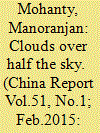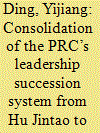| Srl | Item |
| 1 |
ID:
136990


|
|
|
|
|
| Summary/Abstract |
This article addresses the question of why despite the enormous success achieved by China in economic growth there are significant indicators showing relatively adverse life situations for women in many respects. A falling proportion of women in the population, unfavourable employment situation, disparity in wages, inadequate representation of women in political leadership are some of the indicators of the negative fallout of the Chinese growth story even as women too have benefited from the substantial improvement of Chinese people’s livelihood conditions during the recent decades. Based on field visits to Wuxi over a thirty-year period and using macro data we argue that the Chinese experience raises serious questions about the pattern of economic growth that has been adopted by the Chinese leadership and advanced globally in recent years.
|
|
|
|
|
|
|
|
|
|
|
|
|
|
|
|
| 2 |
ID:
136991


|
|
|
|
|
| Summary/Abstract |
The People’s Republic of China went through a peaceful and orderly transfer of power from November 2012 to March 2013, the second one in its 64-year history. The first one was the 2002–3 change of leadership from Jiang Zemin to Hu Jintao. While largely following the same pattern, the recent leadership change, from Hu Jintao to Xi Jinping, illustrated a few interesting and potentially significant differences even as the succession system was further consolidated. This article compares the recent leadership change with the previous one, analyses the differences and discusses their political implications. The increasingly institutionalised procedure for China’s leadership succession now features the state leaders’ tenure being limited to two consecutive five-year terms, and the choice of successors through a gradually broadening elite consensus. For the Chinese Communist Party, the purpose of the term limit is to prolong its one-party rule by having orderly power transfers and avoiding succession crises. The limited term of office is likely to contribute to China’s political stability while promoting a degree of institutionalised intra-party factional competition.
|
|
|
|
|
|
|
|
|
|
|
|
|
|
|
|
| 3 |
ID:
136992


|
|
|
|
|
| Summary/Abstract |
On 12 and 13 August 2014, China organized a conference titled, ‘Forum on the Development of Tibet’ in Lhasa. Out of the 100 or so participants, about 40 were international participants from about 30 countries. This article materialized out of an interest to probe a few inter-related questions such as what is the point of holding another Forum on development of Tibet when the ‘Tibet work forums’ are already doing that since 1980? Why are there international participants in it? What is the significance of the Forum in the Chinese government’s overall approach to the Tibet question? Interestingly, the conference did not have a dedicated website or it’s like where one could access information about it. On its conclusion, a document ‘Lhasa Consensus’ was brought out, which failed to provide any sense of the conference’s proceedings. Instead, it emphasized Chinese achievements in Tibet and denounced the Dalai Lama and international media for being biased. Outside China, the Forum attracted attention less for its stated agenda but more for its possible objectives. In effect, the organisers lost an opportunity to chart a new discourse on Tibet’s development sans politics. The Forum ultimately seems to be part of Beijing’s attempt at gaining lost ground on international propaganda on Tibet.
|
|
|
|
|
|
|
|
|
|
|
|
|
|
|
|
| 4 |
ID:
136989


|
|
|
|
|
| Summary/Abstract |
Despite the universality of marriage in Chinese society, involuntary bachelorhood exists, and is becoming an increasingly critical issue. While many studies have addressed the problem from the standpoint of demographic imbalance, we argue that the issue should be understood as a manifestation of the gendered features of the marriage system which work against low-class men. This understanding relates involuntary bachelorhood to the combined effects of spouse selection and marriage practices. To elaborate our argument, the present study explores nuptiality plights of involuntary bachelors. In particular, it examines their marginalisation in the marriage market, defiant choices in the face of market exclusion, and instability of marital relationships.
|
|
|
|
|
|
|
|
|
|
|
|
|
|
|
|